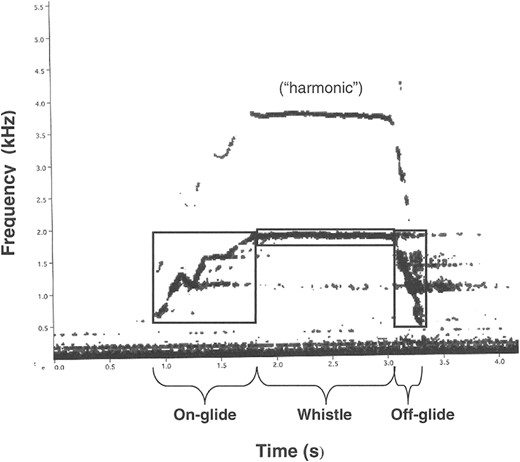Huntin_GI
WKR
So I'm prepping for the season, channeling my inner @ElkNut1 and got to thinking, how do I know if my pitch is accurate? Video cameras mics typically fail to capture the higher and lower frequencies when video demonstrations are made. Everyone's ears are a little different and hear things differently. Couple that with the fact how much different a bugle tube sounds when you are the one blowing it and it becomes hard to know how "accurate" my calling is.
Mind you, I do use the Elknut app but doubt the capabilities of my phones microphone to register the full spectrum of a bugle.
This led me to Google.

 academic.oup.com
academic.oup.com
The findings were published in the Journal of Mammalogy and aren't nessecarily ground breaking but worth looking at. The paper breaks down the duration of the "On-glide" (build up to top note), the whistle, and the "off-glide" to include the frequency of each. It also points out post bugle chuckles are only present 16% of the time and were never measured to account for more than 5 post bugle chuckles.
Have any of y'all ever used quality recording equipment and checked your average duration or whistle (the high note we hold at the top of a bugle) pitch? I've got the gear and think I will at least take and afternoon outside and see where mine falls on the spectrum.
Full disclosure, the sample size in this study was relatively small but I wouldn't expect expanding the study to dramatically effect the averages they found to be true.
Mind you, I do use the Elknut app but doubt the capabilities of my phones microphone to register the full spectrum of a bugle.
This led me to Google.

North American Elk Bugle Vocalizations: Male and Female Bugle Call Structure and Context
Abstract. Bugle calls of male North American elk (Cervus elaphus) are common sounds during fall in the Canadian and United States Rocky Mountains. In contrast,
North American Elk Bugle Vocalizations: Male and Female Bugle Call Structure and Cont
The findings were published in the Journal of Mammalogy and aren't nessecarily ground breaking but worth looking at. The paper breaks down the duration of the "On-glide" (build up to top note), the whistle, and the "off-glide" to include the frequency of each. It also points out post bugle chuckles are only present 16% of the time and were never measured to account for more than 5 post bugle chuckles.
Have any of y'all ever used quality recording equipment and checked your average duration or whistle (the high note we hold at the top of a bugle) pitch? I've got the gear and think I will at least take and afternoon outside and see where mine falls on the spectrum.
Full disclosure, the sample size in this study was relatively small but I wouldn't expect expanding the study to dramatically effect the averages they found to be true.

